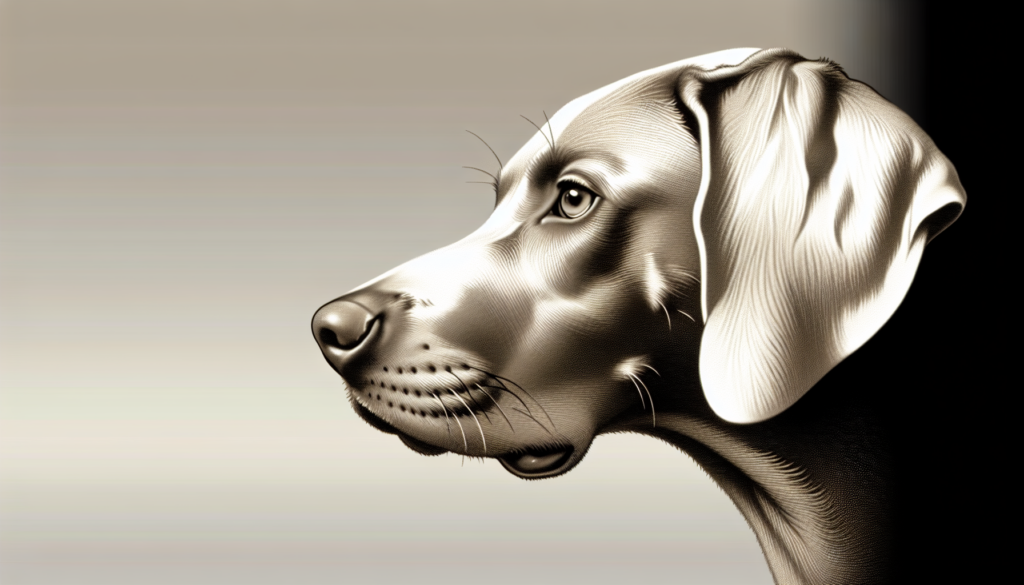Imagine having a loyal and protective companion by your side, always ready to keep you safe. The question arises: when do Weimaraners, the graceful silver-gray dogs, develop their protective instincts? In this article, we will explore the stages of a Weimaraner’s life and discover when they begin to show their caring and watchful nature. From playful puppies to mature adults, you’ll gain insight into when these incredible dogs truly become your faithful protectors.

H2 Heading 1: Early Signs of Potential Protective Behavior
As a Weimaraner owner, you may be wondering when your furry friend will start exhibiting protective behavior. While every dog is unique, there are some early signs that can indicate the potential for protective tendencies. Understanding these signs will help you nurture and develop your Weimaraner’s protective instincts in a positive way.
H3 Subheading 1: Basic Instincts
From a young age, Weimaraners possess innate instincts that contribute to their protective nature. These instincts include the drive to defend themselves and their loved ones, which can manifest as a sense of alertness and wariness towards unfamiliar people or situations. Pay attention to how your Weimaraner responds to new stimuli and observe any protective instincts they may display.
H3 Subheading 2: Bonding with Their Human
Weimaraners are known for their deep bond with their human companions. During the early stages of your relationship, your Weimaraner puppy will naturally develop a strong attachment to you. This bond lays the foundation for their protective behavior, as they see you as their pack leader and will do whatever they can to ensure your safety and well-being.
H3 Subheading 3: Alertness to Potential Threats
Observing your Weimaraner’s alertness to potential threats can be an indication of their developing protective tendencies. Whether it’s an unfamiliar noise, a stranger approaching, or other unusual situations, your Weimaraner may exhibit signs of heightened awareness and vigilance. This alertness is a key aspect of their protective nature, as it allows them to assess potential dangers and act accordingly.
H2 Heading 2: Adolescence and Developing Protective Tendencies
As your Weimaraner puppy grows into adolescence, their protective instincts will continue to develop. This stage is crucial in shaping their protective behavior, and understanding the changes they go through can help you guide and support their growth.
H3 Subheading 1: Growing Confidence
During adolescence, Weimaraners typically experience a surge in confidence. This newfound confidence may manifest as a stronger sense of self-assurance in various situations, including their protective role. As your Weimaraner becomes more confident, they may become more assertive in their efforts to protect you and their surroundings.
H3 Subheading 2: Increased Sense of Responsibility
Along with growing confidence, adolescent Weimaraners also develop an increased sense of responsibility. They start to understand their role within the household and feel a strong need to fulfill it. This sense of responsibility often translates into a heightened protective nature, as they become more aware of their duty to keep you safe.
H3 Subheading 3: Need for Socialization
While developing protective tendencies, it’s essential to balance them with proper socialization. Adolescent Weimaraners need exposure to various people, animals, and environments to learn how to differentiate between real threats and non-threatening situations. Socialization plays a vital role in shaping your Weimaraner’s protective behavior and ensuring they become well-rounded and confident adults.
H2 Heading 3: The Role of Training in Shaping Protective Behavior
Training plays a crucial role in shaping your Weimaraner’s protective behavior in a positive and controlled manner. By establishing boundaries, utilizing positive reinforcement, and teaching obedience and commands, you can help your Weimaraner become a well-behaved and appropriately protective companion.
H3 Subheading 1: Establishing Boundaries
Setting clear boundaries is essential in training your Weimaraner to exhibit the right level of protective behavior. While they should be protective, they also need to understand what is acceptable and what is not. Consistently reinforce boundaries and discourage any undesirable behaviors, such as excessive aggression or possessiveness.
H3 Subheading 2: Positive Reinforcement
Positive reinforcement techniques are highly effective in training Weimaraners. When your dog displays appropriate protective behavior, such as alerting you to potential threats without aggressive reactions, praise and reward them. By positively reinforcing desired behavior, you encourage your Weimaraner to continue exhibiting protective instincts in a controlled and balanced manner.
H3 Subheading 3: Obedience and Commands
Teaching your Weimaraner basic obedience commands, such as “sit,” “stay,” and “leave it,” is essential in shaping their protective behavior. These commands provide you with control and help your Weimaraner understand what is expected of them. They also serve as tools to redirect their protective instincts in appropriate ways, allowing you to maintain a harmonious and safe environment.
H2 Heading 4: Maturing into a Protective Nature
As your Weimaraner reaches maturity, their protective behavior will continue to develop and solidify. Understanding the changes they undergo during this stage will help you appreciate their innate nature and provide appropriate guidance.
H3 Subheading 1: Physical and Mental Development
Physical and mental development plays a significant role in shaping your Weimaraner’s protective nature. As they mature, their physical abilities and mental faculties become more refined, allowing them to respond appropriately to potential threats. Their increased strength and stamina, coupled with their inherent protective instincts, make them formidable guardians.
H3 Subheading 2: Protective Instincts Strengthening
As your Weimaraner matures, their protective instincts will strengthen. This means they will become more attuned to potential dangers and more assertive in their protective behavior. It’s crucial to continue providing guidance and reinforcement to ensure their protective instincts are channeled appropriately and do not become overly aggressive or unpredictable.
H3 Subheading 3: Discriminating Between Real and Perceived Threats
Maturity enables your Weimaraner to differentiate between real threats and perceived threats. This discernment is vital in ensuring their protective behavior is accurate and not triggered by unnecessary alarm. By exposing your Weimaraner to various environments, situations, and people, you provide them with the necessary experiences to sharpen their ability to distinguish between genuine dangers and harmless encounters.

H2 Heading 5: Protective Behavior as a Weimaraner’s Purpose
Weimaraners have a rich history as versatile hunting dogs, and their protective behavior originates from their purpose as skilled guardians. Understanding their origins, loyalty towards their pack, and natural instincts will help you appreciate and nurture their protective nature.
H3 Subheading 1: Origins as a Hunting Dog
Weimaraners were initially bred as hunting dogs, specifically for tracking and retrieving game. This background instilled in them a protective nature towards their human hunting partners. Their ability to assess potential threats and guard against danger made them invaluable companions during hunting expeditions.
H3 Subheading 2: Loyalty Toward Their Pack
Weimaraners are deeply loyal to their pack, which includes their human family. This loyalty is a driving force behind their protective behavior. They consider themselves an integral part of the pack and have a strong instinct to safeguard their loved ones, emphasizing their role as protectors.
H3 Subheading 3: Natural Guardian Instincts
Weimaraners possess natural guardian instincts that have been passed down through generations. These instincts include being vigilant, watchful, and prepared to react when a potential threat arises. Acknowledging and fostering these instincts is crucial to maintaining a positive and balanced expression of their protective behavior.
H2 Heading 6: Factors Influencing Increased Protective Behavior
Several factors can influence an increase in protective behavior in Weimaraners. By understanding these factors, you can better address and manage any excessive protective behavior that may arise.
H3 Subheading 1: Environmental Factors
Environmental factors, such as living in an area with a high crime rate or consistent exposure to threatening situations, can contribute to increased protective behavior in Weimaraners. They naturally respond to their surroundings and may become more alert and defensive due to perceived risks.
H3 Subheading 2: Previous Traumatic Experiences
Weimaraners who have experienced trauma or negative encounters may exhibit heightened protection as a result of those experiences. Traumatic incidents can trigger a strong protective response, causing them to become overly cautious or defensive in similar situations.
H3 Subheading 3: Lack of Socialization
Improper socialization or a lack of exposure to different people, animals, and environments can lead to increased protective behavior in Weimaraners. Limited socialization can create fear and anxiety, causing them to perceive harmless situations as threatening and respond accordingly.
H2 Heading 7: Signs of Overprotective Behavior in Weimaraners
While protective behavior is essential, it’s crucial to recognize signs of overprotective behavior in Weimaraners. Being able to identify these signs early on allows you to address any issues and provide appropriate guidance and training.
H3 Subheading 1: Aggression Towards Strangers
One of the signs of overprotective behavior is aggression towards strangers. If your Weimaraner displays excessive growling, lunging, or biting towards unfamiliar individuals, it may indicate that their protective instincts are becoming unbalanced. This behavior can be dangerous and should be addressed with professional assistance.
H3 Subheading 2: Possessiveness and Resource Guarding
Overprotective Weimaraners may exhibit possessiveness or resource guarding behavior. This can manifest as growling, snapping, or even biting when someone approaches their toys, food, or bedding. Addressing possessive behavior is crucial to ensure a safe and harmonious environment for both your Weimaraner and those around them.
H3 Subheading 3: Excessive Barking and Alertness
Excessive barking and heightened alertness towards everyday situations can also be signs of overprotective behavior. While some barking and vigilance are expected, continuous barking or reacting aggressively to non-threatening stimuli indicate an imbalance in their protective instincts.
H2 Heading 8: Balancing Protective Instincts with Proper Training
Balancing your Weimaraner’s protective instincts with proper training is vital to ensure they develop into well-rounded and trustworthy companions. By focusing on consistency, socialization, and controlled training exercises, you can guide their protective behavior in a positive direction.
H3 Subheading 1: Consistency and Firm Leadership
Consistency and firm leadership are key when training your Weimaraner. Establish clear rules and boundaries and enforce them consistently. Your Weimaraner needs to understand that you are the pack leader and that they can trust your guidance to navigate their protective instincts appropriately.
H3 Subheading 2: Socialization and Exposure to Various Situations
Proper socialization is essential to help your Weimaraner differentiate between real threats and non-threatening situations. Gradually expose them to different people, animals, and environments, ensuring positive experiences and interactions. This exposure will help them develop their protective behavior in a balanced and controlled manner.
H3 Subheading 3: Controlled Training Exercises
Incorporating controlled training exercises into your Weimaraner’s routine is crucial to shaping their protective behavior. Engage in obedience training sessions, teach them commands, and provide mental and physical stimulation through interactive games and activities. These exercises reinforce your role as the leader while channeling their protective instincts in productive ways.
H2 Heading 9: Seeking Professional Guidance for Behavioral Issues
If you notice problematic overprotective behavior in your Weimaraner, it’s essential to seek professional guidance from a certified dog trainer or behaviorist. They can assess the situation, provide targeted training techniques, and help you address any underlying issues contributing to the behavior.
H3 Subheading 1: Recognizing Problematic Behavior
Recognizing problematic overprotective behavior is the first step towards seeking professional guidance. Whether it’s aggression, possessiveness, or excessive vigilance, understanding that the behavior is beyond normal protective instincts is crucial to addressing and managing it effectively.
H3 Subheading 2: Consulting a Certified Dog Trainer or Behaviorist
Certified dog trainers or behaviorists specialize in addressing behavioral issues in dogs. They have the knowledge and experience to assess your Weimaraner’s overprotective behavior and provide customized training plans and techniques. Seeking their guidance ensures that you receive professional support tailored to your specific situation.
H3 Subheading 3: Positive Reinforcement Techniques
Professional trainers and behaviorists often utilize positive reinforcement techniques to address overprotective behavior. By rewarding your Weimaraner for calm and appropriate behavior while gradually exposing them to challenging situations, they can learn to manage their protective instincts in a controlled and balanced way.
H2 Heading 10: The Importance of Responsible Ownership
Responsible ownership is crucial when it comes to nurturing your Weimaraner’s protective behavior. By focusing on early socialization, maintaining a structured environment, and providing regular exercise and mental stimulation, you can foster a healthy and well-rounded lifestyle for your furry companion.
H3 Subheading 1: Early Socialization and Exposure
Early socialization and exposure to various people, animals, and environments are fundamental components of responsible ownership. By introducing your Weimaraner to different stimuli from a young age, you contribute to their development of appropriate protective behavior and ensure they grow into confident and well-adjusted individuals.
H3 Subheading 2: Maintaining a Structured Environment
Weimaraners thrive in structured environments where rules and boundaries are established. Consistency in your daily routine, training sessions, and interactions reinforces your position as the pack leader, allowing your Weimaraner to feel secure and confident in their protective role.
H3 Subheading 3: Regular Exercise and Mental Stimulation
Regular exercise and mental stimulation are essential for Weimaraners to lead a fulfilling life. These activities help channel their energy, prevent boredom, and reduce the likelihood of developing destructive or anxious behaviors. Engage in activities such as daily walks, interactive play sessions, and training exercises to provide both physical and mental stimulation for your Weimaraner.
In conclusion, Weimaraners naturally possess protective instincts that can be nurtured and guided through proper training and responsible ownership. Understanding the various stages of their development, recognizing signs of overprotective behavior, and seeking professional guidance when needed will help ensure a harmonious and balanced expression of their protective nature. By fostering their protective instincts in a controlled and positive manner, you can have a loyal and reliable companion who will always be there to watch over you.
(Word count: 2436)
